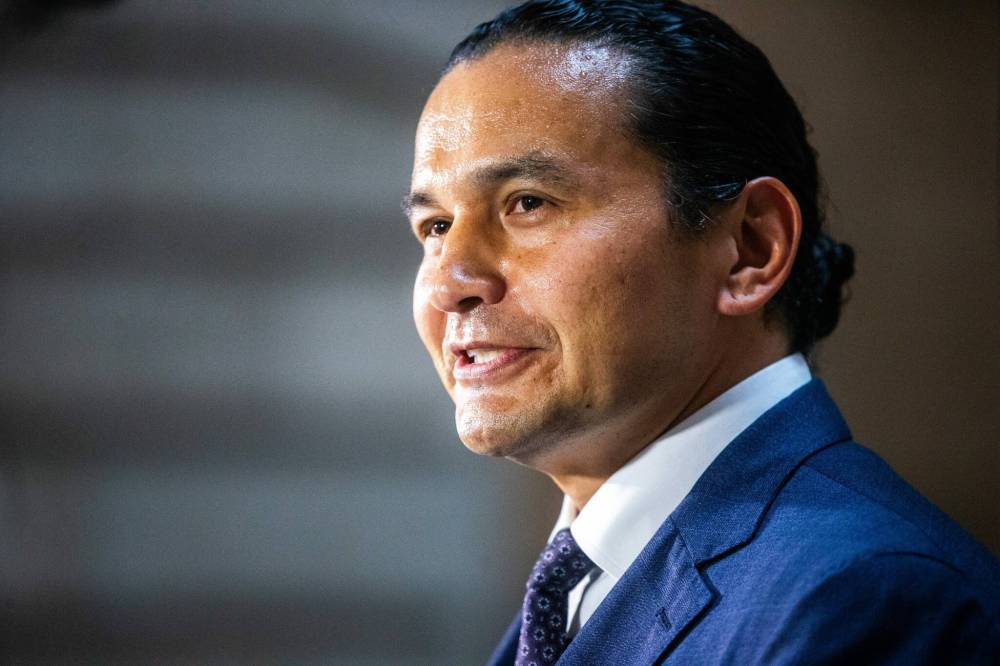The province is planning to let Winnipeg Metropolitan Region communities decide whether they will opt in or out of the controversial Plan 20-50.
“This fall, when the legislature returns, we’re going to bring in a bill that we’re calling a freedom bill, to give municipalities the freedom to leave the metro region and to make being a member of that voluntary,” Premier Wab Kinew told the Free Press Tuesday evening.
The proposed Plan 20-50 would guide collaboration among Winnipeg and 17 surrounding municipalities on everything from land use to recreation over the next 30 years, if approved.
The region accounts for about two-thirds of Manitoba’s population and its GDP.

MIKAELA MACKENZIE / FREE PRESS FILES
Premier Wab Kinew says his government will give municipalities the freedom to leave the metro region and to make being a member of the controversial Plan 20-50 voluntary.
Kinew’s promise comes after at least five municipalities publicly opposed parts of the plan, raising concerns that it undermines their decision-making powers.
“We certainly heard all of the concerns raised recently,” he said.
“We just think it’s the right fit to ensure that those local, democratically elected leaders have their decision-making power respected and they have the ability to determine their own destinies at the local level.”
Currently, local governments are required by legislation to participate in regional planning.
“I think that ensuring that the local leadership have that latitude and flexibility and liberty to be able to plan for themselves is really important,” Kinew said.
“So just making this a voluntary participation instead of something that’s mandated, as it was under the previous government, is an important step forward.”
“I think that ensuring that the local leadership have that latitude and flexibility and liberty to be able to plan for themselves is really important.”–Manitoba Premier Wab Kinew
The premier said he won’t move to scrap the regional plan altogether, noting municipalities could still choose to remain part of it.
The former Progressive Conservative government introduced legislation that required the plan and created the Winnipeg Metropolitan Region corporation to develop it.
This week, the current PC opposition urged the NDP government to pause the planning process to allow more consultation.
“(They should) slow things down here a bit… there’s definitely been a lot of concern from residents and some municipalities now,” said Trevor King, the PC critic for municipal relations.
King said Plan 20-50 should be completed, and would ultimately help the region.
“The value is working together as municipalities, municipal governments for environmental issues, land-use issues,” he said.
Duane Nicol, chief administrative officer of the City of Selkirk, said he believes more than five communities at least partially oppose the plan. He said the WMR recently advised members of its board, which consists mostly of the mayors and reeves of the 18 municipalities, not to speak to media.

MIKE SUDOMA / FREE PRESS FILES
Chief administrative officer of the City of Selkirk, Duane Nicol, says he believes more than five communities at least partially oppose the plan.
“That’s one of the problems of this so-called governance structure,” Nicol said Tuesday. “We have a situation where elected representatives are not able to represent their communities because they are on this board.”
He said Selkirk has been asking for an exemption since the process started.
“We are our own region,” he said. “More Winnipeggers come to Selkirk to work than the other way around.”
Selkirk needs to maintain its decision-making autonomy, he said.
“The capital planning region intends on getting into the areas of asset management, infrastructure provision… providing guidance and setting priorities for provincial government granting. All of this (would remove) authority and flexibility of our elected council to develop our community according to our vision,” he said.
While Plan 20-50 offers little detail on the exact changes it could usher in, it does suggest municipalities set higher-density housing targets and collaborate on everything from transit routes and firefighting services to waste water infrastructure and recreation.
“We are our own region… More Winnipeggers come to Selkirk to work than the other way around.”–Duane Nicol
If a regional plan is approved, municipalities would be expected to update bylaws to conform, and avoid passing rules that contradict it.
“Municipalities and planning districts will not give third reading to a development plan bylaw, secondary plan bylaw or zoning bylaw that is inconsistent with Plan 20-50,” reads the latest version of the plan.
The document does stress that any increase to housing density should occur in a “subtle, incremental way.”
The Town of Niverville and rural municipalities of Headingley, St. Andrews and East St. Paul have posted online statements that oppose at least parts of the plan.
“The Town of Niverville has consistently expressed concerns related to our forced involvement in the Winnipeg Metro Region and subsequently the proposed Plan 20-50,” the statement says.
Headingley said the plan’s vision conflicts with its goal to maintain a semi-rural environment with modest growth.
St. Andrews’ statement supports the concept of a regional plan but suggests the changes could come at the price of local decision-making, and East St. Paul warns it could erode local governance and cost taxpayers more money.
“The financial burden of implementing these mandates could lead to increased taxes or cuts to essential services, neither of which are acceptable outcomes for our residents,” East St. Paul’s statement says.
In a Tuesday-evening statement, Winnipeg Mayor Scott Gillingham emphasized his support for collaboration between municipalities to help them compete with other regions.
“If we don’t get serious about co-operation, other regions — like Calgary, Minneapolis, or even Saskatoon — will eat our lunch. Manitobans want to know all levels of government are working together, not against each other — whether it’s through an amended capital region plan or a different agreement,” wrote Gillingham.
In a written statement, the executive director of the Winnipeg Metropolitan Region said the board has temporarily adjourned the Plan 20-50 public hearing process.
Jennifer Freeman said members of the WMR board can’t discuss the plan outside of the public hearing forum during the adjournment.
“The public hearing process is governed by provincial legislation, which ensures fairness, transparency, and equal opportunity for all stakeholders to provide input,” she wrote.
joyanne.pursaga@freepress.mb.ca
X: @joyanne_pursaga

Joyanne Pursaga
Reporter
Joyanne is city hall reporter for the Winnipeg Free Press. A reporter since 2004, she began covering politics exclusively in 2012, writing on city hall and the Manitoba Legislature for the Winnipeg Sun before joining the Free Press in early 2020. Read more about Joyanne.
Every piece of reporting Joyanne produces is reviewed by an editing team before it is posted online or published in print — part of the Free Press‘s tradition, since 1872, of producing reliable independent journalism. Read more about Free Press’s history and mandate, and learn how our newsroom operates.
Our newsroom depends on a growing audience of readers to power our journalism. If you are not a paid reader, please consider becoming a subscriber.
Our newsroom depends on its audience of readers to power our journalism. Thank you for your support.